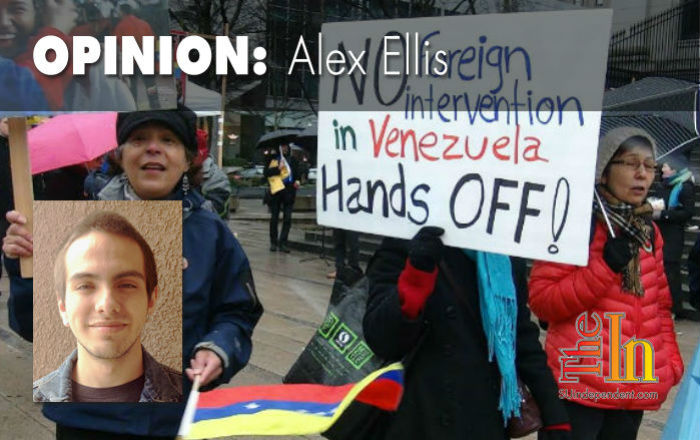
Written by Alex Ellis
Since the Bush era and the failed conflict in Iraq, the Democratic party has marketed itself as having an anti-war stance. Despite this, nearly half of the Democratic senators voted in favor of the Iraq Resolution, including party leaders such as Hillary Clinton, Joe Biden, Harry Reid, Dianne Feinstein, and John Kerry. This anti-war stance has been a primary issue for the party and was one of president Obama’s major planks during his first presidential electoral campaign. While Obama has kept his promise of ending the war in Iraq, he has meanwhile helped increase tensions in Syria, Ukraine, and as of last week, Venezuela.
In a brazen move, president Obama announced that Venezuela is a threat to United States national security. This announcement came shortly after the failure of an attempted coup with similarities to that of a coup attempted in 2002, which had ties to the United States. Ironically Obama’s claims of a Venezuelan threat are being seen as a threat against Venezuelan sovereignty and have sparked protests in Latin America including Cuba, with whom the U.S. has recently begun to normalize relationships with.
Some may be asking exactly how Venezuela presents a threat to the United States. Is it their military? Well, the military of Venezuela has an annual budget of about $6.5 billion, with just over 100,00 personnel. While this may seem large, it dwarfs in comparison to the U.S. military, which has a budget of over $512 billion with 1.3 million active members and 850,000 in reserve. Also, unlike the United States, the current government of Venezuela (established in 1999) has never fought a war of aggression on foreign soil.
Clearly the threat from Venezuelan military forces is minimal, so where exactly does the threat to the United States come from? Perhaps the threat is not to national security as president Obama claims, but to the United States interests in the southern hemisphere.
United States intervention in Latin America is no new phenomena. From the signing of the Monroe Document in 1823, which all but declared U.S. hegemony in the Western hemisphere, to the attempted Venezuelan coup in 2002, the United States has a long history of maintaining its interests in the region through violence. Cuba, Nicaragua, Brazil, Guatemala, Chile, Argentina, and the Dominican Republic are just some of the countries the U.S. has either helped instigate or supported coup d’etats in. Venezuela however has remained relatively untouched, and a constant critic of the U.S. since its revolution in 1999.
Now the United States leadership is sounding the alarm again, claiming yet another country needs our “assistance”. They state that the Socialist government of Venezuela is unpopular with the local population, despite the fact that former president Hugo Chavez and current president Nicolas Maduro have won a combined total of four elections, all of which were open to foreign inspection. The people of Venezuela seem to disagree with president Obama’s assertions, and have helped to start the “Hands Off Venezuela” movement. This movement, trending on twitter with the hashtag #handsoffvenezuela, aims to keep the fate of the Venezuelan people in their own hands rather than leave it to the whims of the political, corporate, and military elite of the U.S. Many feel the reason U.S. officials are becoming interested in the country is due to the fact that Venezuela is reported to have the largest oil reserves in the world. Anyone reminded of the war in Iraq?
Regardless of any speculation, the one thing that remains clear is that the Obama administration stands in opposition to the current Venezuelan government. Whether it be over oil, political influence, or human rights abuses as the president claims, the tension is there. However, while Venezuela may criticize the United States, they present no threat. The people of Venezuela have neither the means nor the interest to fight the U.S., and as such the president’s claims that Venezuela poses a “threat to national security” should be treated as what they are: threats to Venezuelan sovereignty.
We all know what will happen if these actions go unopposed. The rhetoric will intensify, the situation will purportedly become more dire, and eventually we will be “forced” to take action. We saw it in Iraq, we saw it in Afghanistan, and we very recently almost saw it in Syria and Ukraine. After so much needless violence, America has become a war-weary nation. It’s one of the reasons president Obama was elected twice. But now, the same man we trusted to bring us peace is starting to beat the war drum once more. If we are to be the righteous supporters of justice and democracy that so many believe the United States to be, we must demand that our elected representatives respect the choices of the Venezuelan people and not plunge us into yet another war.




